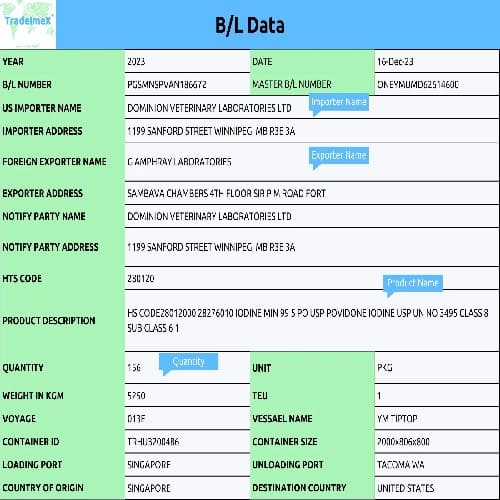


Shipment data refers to detailed records of goods transported across international borders
In the rapidly evolving world of global trade, the importance of identifying reliable buyers and suppliers cannot be overstated. Trustworthy trade partners form the backbone of successful international business operations, ensuring seamless transactions, sustained growth, and mutual benefits. Shipment data, a treasure trove of trade information, has emerged as a powerful tool for businesses to identify, analyze, and verify reliable trade partners worldwide. This article explores how shipment data can be utilized to pinpoint trustworthy buyers and suppliers, offering actionable tips for companies aiming to optimize their trade relationships.
Shipment data refers to detailed records of goods transported across international borders. This data is collected from sources like customs records, shipping manifests, and trade databases. It includes vital information such as:
By analyzing shipment data, businesses can gain insights into global trade flows, track competitors, and evaluate the credibility of potential partners.
Review the trade history of potential partners to determine their experience in international trade. Look for details such as:
Identify partners who specialize in specific products or industries. Shipment data includes product descriptions, which can be analyzed to:
Geographic data in shipment records helps determine if a potential partner has experience dealing with your target market. Assess:
Shipment data often includes compliance-related information, such as adherence to export and import regulations. Use this data to:
Shipment data can reveal connections between buyers, suppliers, and other trading entities. Assess:
Efficient logistics and timely deliveries are hallmarks of reliable trade partners. Analyze shipment data for:
Use shipment data to gain insights into the trading activities of your competitors. This can help you:
Leverage specialized trade intelligence platforms that consolidate shipment data, offering advanced analytics and reporting features. These tools allow you to:
Cross-reference shipment data with financial information where possible to ensure potential partners are financially stable.
Assess cultural alignment by understanding the partner’s business practices, communication style, and values. While shipment data provides insights into their trade activities, a deeper investigation into their organizational culture can help establish a strong working relationship.
Beyond shipment data, seek references and testimonials from other businesses that have worked with the potential partner. Combined with shipment insights, this helps paint a comprehensive picture.
Shipment data provides a factual basis for identifying and evaluating trade partners, minimizing reliance on subjective assessments.
By identifying reliable partners, businesses can avoid costs related to failed transactions, product returns, or delayed shipments.
Analyzing shipment data enriches market knowledge, helping businesses stay ahead of trends and seize emerging opportunities.
Selecting partners based on robust data fosters trust and long-term collaboration, ensuring sustainable growth.
The global marketplace offers immense opportunities, but navigating its complexities requires strategic tools like shipment data. By analyzing trade patterns, compliance records, and shipping practices, businesses can identify and verify reliable buyers and suppliers who align with their goals. Combining data-driven insights with due diligence ensures informed decisions, reduces risks, and paves the way for enduring partnerships.
Incorporate shipment data into your trade strategy today, and unlock new possibilities for growth and success in the ever-expanding world of international commerce.
